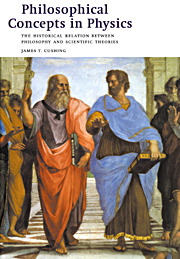 Philosophical Concepts in Physics
Philosophical Concepts in Physics Published online by Cambridge University Press: 05 June 2012
[T]hat which makes the earth move [in its orbit about the sun] is a thing similar to whatever moves Mars and Jupiter.… If [one] will advise me as to the motive power of one of these movable bodies, I promise I shall be able to tell him what makes the earth move. Moreover, I shall do the same if he can teach me what it is that moves earthly things downward.
Galileo Galilei, Dialogue Concerning the Two Chief World SystemsEvery body continues in its state of rest, or of uniform motion in a right line, unless it is compelled to change that state by forces impressed upon it.
The change of motion is proportional to the motive force impressed; and is made in the direction of the right line in which that force is impressed.
Hitherto we have explained the phenomena of the heavens and of our sea by the power of gravity, but have not yet assigned the cause of this power. This is certain, that it must proceed from a cause that penetrates to the very centres of the sun and planets, without suffering the least diminution of its force; that operates not according to the quantity of the surfaces of the particles upon which it acts (as mechanical causes used to do), but according to the quantity of the solid matter which they contain, and propagates its virtue on all sides to immense distances, decreasing always as the inverse square of the distances.
To save this book to your Kindle, first ensure no-reply@cambridge.org is added to your Approved Personal Document E-mail List under your Personal Document Settings on the Manage Your Content and Devices page of your Amazon account. Then enter the ‘name’ part of your Kindle email address below. Find out more about saving to your Kindle.
Note you can select to save to either the @free.kindle.com or @kindle.com variations. ‘@free.kindle.com’ emails are free but can only be saved to your device when it is connected to wi-fi. ‘@kindle.com’ emails can be delivered even when you are not connected to wi-fi, but note that service fees apply.
Find out more about the Kindle Personal Document Service.
To save content items to your account, please confirm that you agree to abide by our usage policies. If this is the first time you use this feature, you will be asked to authorise Cambridge Core to connect with your account. Find out more about saving content to Dropbox.
To save content items to your account, please confirm that you agree to abide by our usage policies. If this is the first time you use this feature, you will be asked to authorise Cambridge Core to connect with your account. Find out more about saving content to Google Drive.